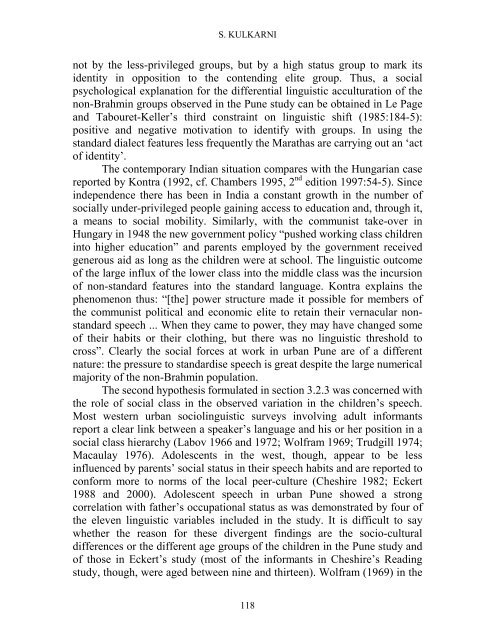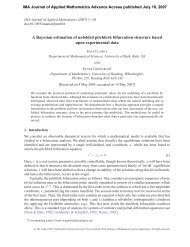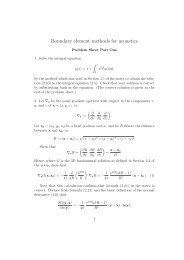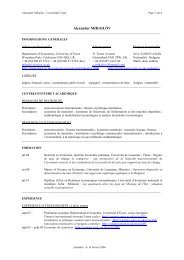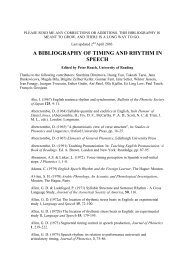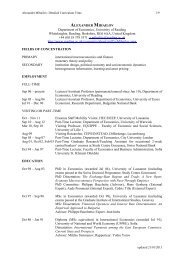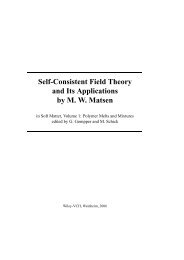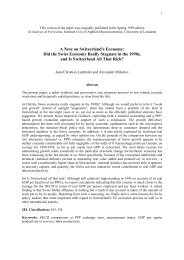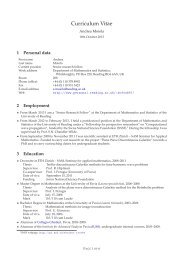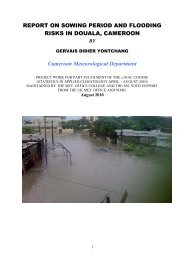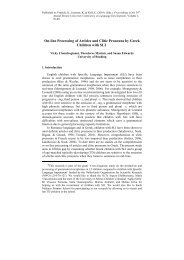Reading Working Papers in Linguistics 4 (2000) - The University of ...
Reading Working Papers in Linguistics 4 (2000) - The University of ...
Reading Working Papers in Linguistics 4 (2000) - The University of ...
You also want an ePaper? Increase the reach of your titles
YUMPU automatically turns print PDFs into web optimized ePapers that Google loves.
S. KULKARNI<br />
not by the less-privileged groups, but by a high status group to mark its<br />
identity <strong>in</strong> opposition to the contend<strong>in</strong>g elite group. Thus, a social<br />
psychological explanation for the differential l<strong>in</strong>guistic acculturation <strong>of</strong> the<br />
non-Brahm<strong>in</strong> groups observed <strong>in</strong> the Pune study can be obta<strong>in</strong>ed <strong>in</strong> Le Page<br />
and Tabouret-Keller’s third constra<strong>in</strong>t on l<strong>in</strong>guistic shift (1985:184-5):<br />
positive and negative motivation to identify with groups. In us<strong>in</strong>g the<br />
standard dialect features less frequently the Marathas are carry<strong>in</strong>g out an ‘act<br />
<strong>of</strong> identity’.<br />
<strong>The</strong> contemporary Indian situation compares with the Hungarian case<br />
reported by Kontra (1992, cf. Chambers 1995, 2 nd edition 1997:54-5). S<strong>in</strong>ce<br />
<strong>in</strong>dependence there has been <strong>in</strong> India a constant growth <strong>in</strong> the number <strong>of</strong><br />
socially under-privileged people ga<strong>in</strong><strong>in</strong>g access to education and, through it,<br />
a means to social mobility. Similarly, with the communist take-over <strong>in</strong><br />
Hungary <strong>in</strong> 1948 the new government policy “pushed work<strong>in</strong>g class children<br />
<strong>in</strong>to higher education” and parents employed by the government received<br />
generous aid as long as the children were at school. <strong>The</strong> l<strong>in</strong>guistic outcome<br />
<strong>of</strong> the large <strong>in</strong>flux <strong>of</strong> the lower class <strong>in</strong>to the middle class was the <strong>in</strong>cursion<br />
<strong>of</strong> non-standard features <strong>in</strong>to the standard language. Kontra expla<strong>in</strong>s the<br />
phenomenon thus: “[the] power structure made it possible for members <strong>of</strong><br />
the communist political and economic elite to reta<strong>in</strong> their vernacular nonstandard<br />
speech ... When they came to power, they may have changed some<br />
<strong>of</strong> their habits or their cloth<strong>in</strong>g, but there was no l<strong>in</strong>guistic threshold to<br />
cross”. Clearly the social forces at work <strong>in</strong> urban Pune are <strong>of</strong> a different<br />
nature: the pressure to standardise speech is great despite the large numerical<br />
majority <strong>of</strong> the non-Brahm<strong>in</strong> population.<br />
<strong>The</strong> second hypothesis formulated <strong>in</strong> section 3.2.3 was concerned with<br />
the role <strong>of</strong> social class <strong>in</strong> the observed variation <strong>in</strong> the children’s speech.<br />
Most western urban sociol<strong>in</strong>guistic surveys <strong>in</strong>volv<strong>in</strong>g adult <strong>in</strong>formants<br />
report a clear l<strong>in</strong>k between a speaker’s language and his or her position <strong>in</strong> a<br />
social class hierarchy (Labov 1966 and 1972; Wolfram 1969; Trudgill 1974;<br />
Macaulay 1976). Adolescents <strong>in</strong> the west, though, appear to be less<br />
<strong>in</strong>fluenced by parents’ social status <strong>in</strong> their speech habits and are reported to<br />
conform more to norms <strong>of</strong> the local peer-culture (Cheshire 1982; Eckert<br />
1988 and <strong>2000</strong>). Adolescent speech <strong>in</strong> urban Pune showed a strong<br />
correlation with father’s occupational status as was demonstrated by four <strong>of</strong><br />
the eleven l<strong>in</strong>guistic variables <strong>in</strong>cluded <strong>in</strong> the study. It is difficult to say<br />
whether the reason for these divergent f<strong>in</strong>d<strong>in</strong>gs are the socio-cultural<br />
differences or the different age groups <strong>of</strong> the children <strong>in</strong> the Pune study and<br />
<strong>of</strong> those <strong>in</strong> Eckert’s study (most <strong>of</strong> the <strong>in</strong>formants <strong>in</strong> Cheshire’s <strong>Read<strong>in</strong>g</strong><br />
study, though, were aged between n<strong>in</strong>e and thirteen). Wolfram (1969) <strong>in</strong> the<br />
118


